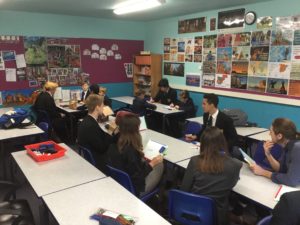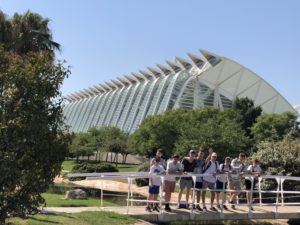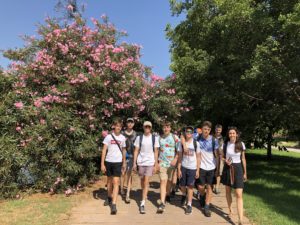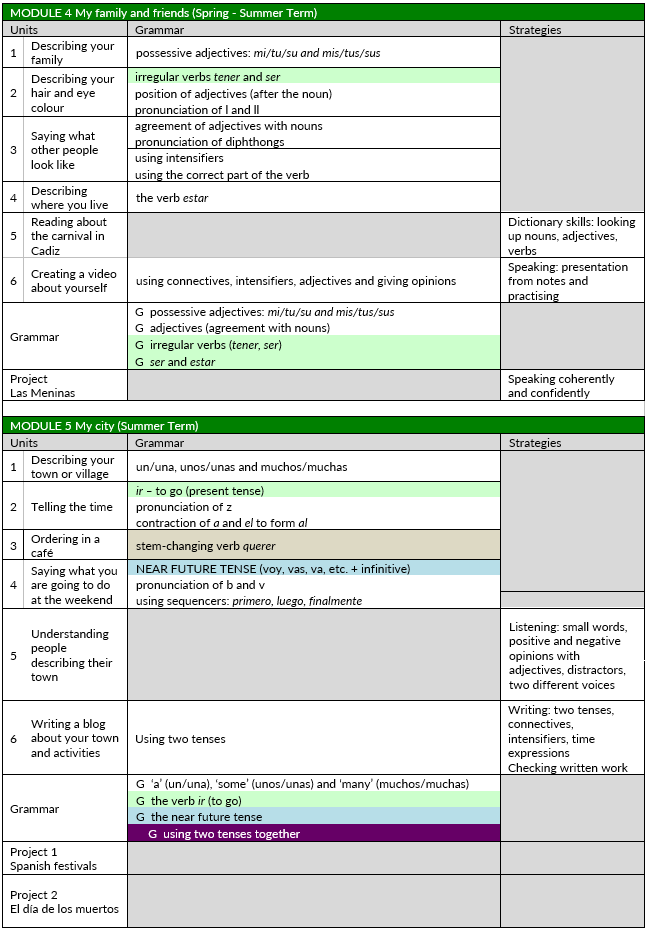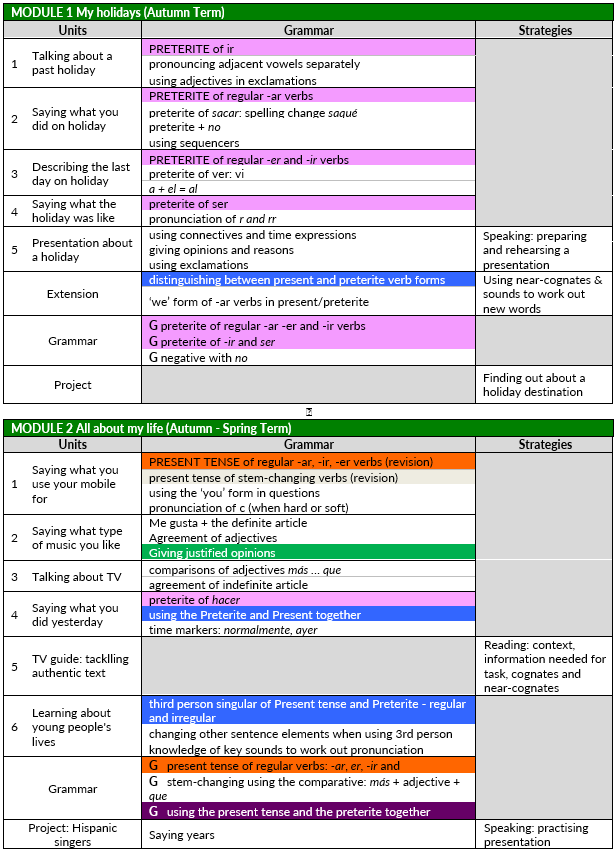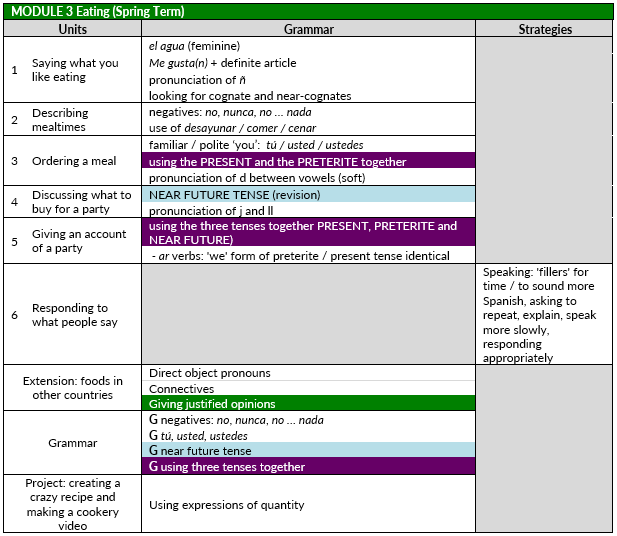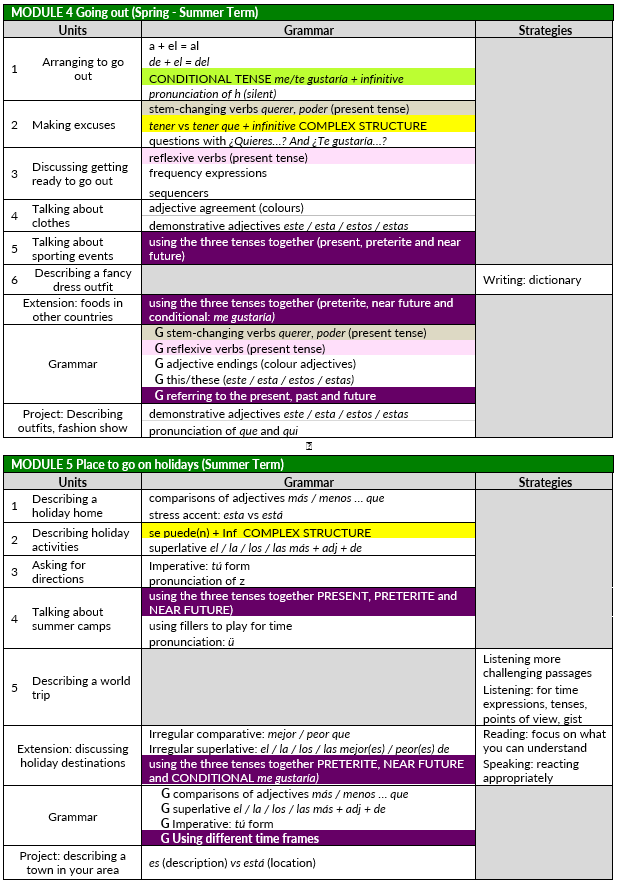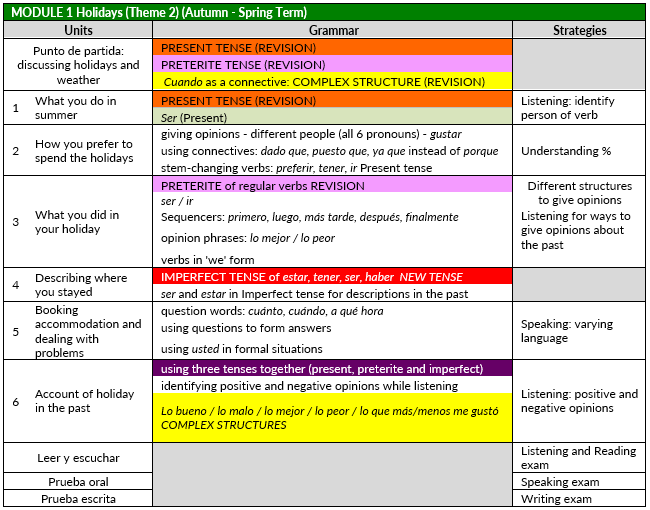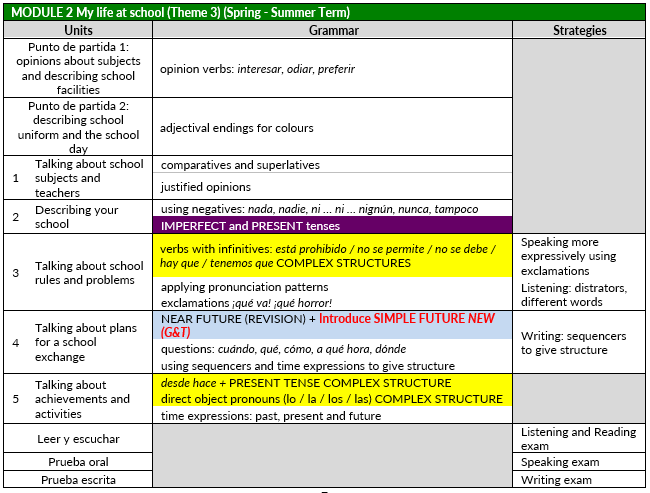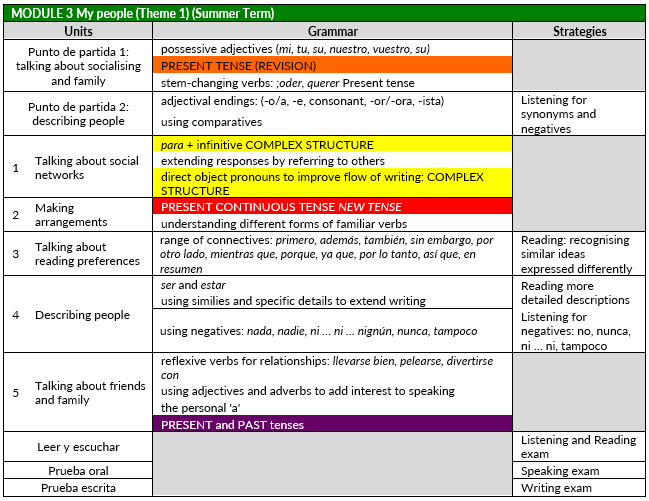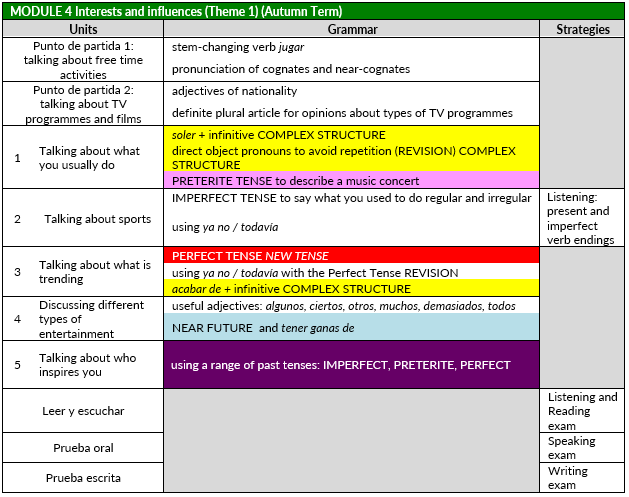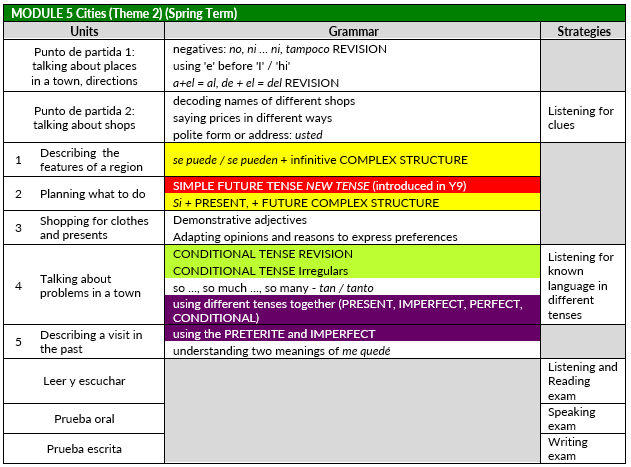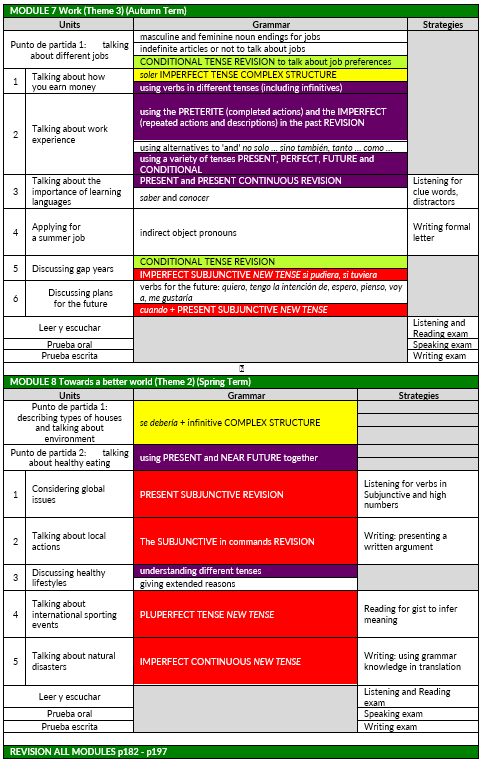Spanish
Head of Department – Mrs M. García de Foster
Torquay Boys’ Grammar School offers students the opportunity to study Spanish and Spanish culture from Year 7 all the way to the Sixth Form in a vibrant department with very dedicated and enthusiastic teachers, two of which are native. At the end of five years, students can reach quite a high level and be able to converse in a good range of topics. Taking Spanish in the Sixth Form will take students to a quite a high level of competence and fluency.
Careers in languages on their own are as varied as working as an interpreter for the EU, translating documents for big companies who have interests abroad, travelling with politicians… Or you could combine Spanish with any other subject, and join an international organisation doing something you are interested in but based in another country, or working for a British company who have contacts with producers abroad. Engineering with Spanish, Law with Spanish, History with Spanish, Sciences with Spanish – there are many opportunities open to you. Take these opportunities, you will not regret it! Spanish holds the key to 21 countries!
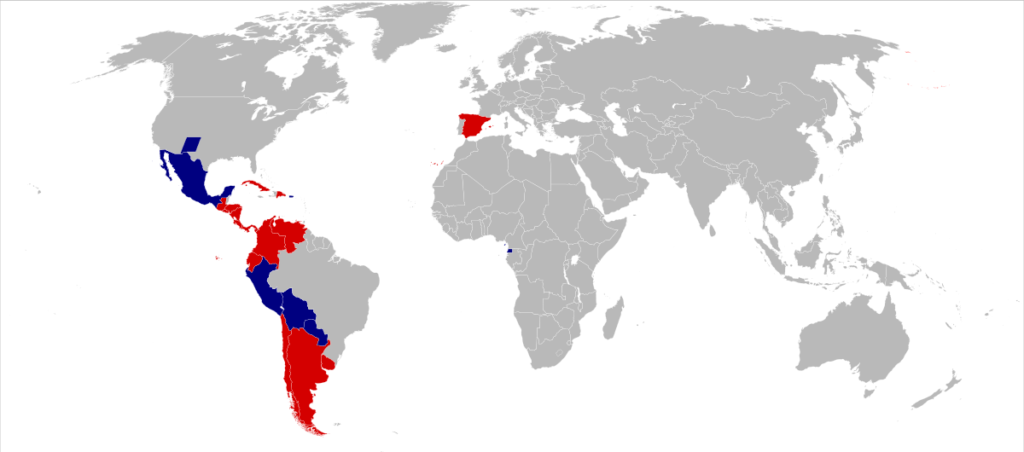
Intent
The Spanish curriculum aims to:
- Give all students a grounding on which to build on the following years Y7 – Y8 – Y9 – GCSE – IB – University – skills to communicate with people from Spanish speaking countries;
- Raise students to be confident when speaking in Spanish, and not to be embarrassed;
- Develop dictionary skills – nurturing an independent enquirer;
- Nurture a love for the language, encouraging students to start to understand the importance of learning languages and how it can open many doors in their future careers and job opportunities – opening the door to language learning and opportunities linked with languages;
- Enable students to be creative with the language, making their sentences more interesting by manipulating the language they know to convey their own ideas;
- Provide opportunities to speak in pairs, developing team work and communication skills;
- Encourage students to take responsibility for own learning by: checking their written work before handing it in and checking corrections, making a note of their own mistakes to avoid making them again;
- Get all students to understand other cultures and how it is important to respect people from other countries and cultures;
- Get students to a level in which they can communicate with people from Spanish-speaking countries, to be confident speakers in all the topics being studied, with strategies to remember vocabulary and structures;
- Provide SEN students with the skills to be able to access language learning at their level – some students find language learning difficult and we need to give them strategies to cope with the subject at their level;
- Establish and guide students to working at the right level at the end of year 10 (e.g. Foundation or Higher) so that they can renew their efforts and work at achieving the best possible result for them.
Implementation
This is achieved by:
- Introducing different structures and tenses according to the schemes of work below. Students need to have the maturity to understand the structures, so we build up to them. It is important to link any new language and structure to language students already know so that they can make the link. This will help them remember their new language;
- Using classroom repetition to improve pronunciation, lots of repetition of new vocabulary – games, different voices, non-threatening questioning to allow all students (no matter what ability) to take part in a safe environment. Plenty of praise is used in the classroom – ticks in their yellow books, names on the board to encourage good participation in lessons and commendations to recognise their effort;
- Giving students opportunities to be independent with their learning: finding new words, knowing how to look for a new word;
- Telling students about the culture of Spanish-speaking countries, and making their learning relevant. Whenever there is an opportunity, we talk to the students about a cultural aspect. This will inspire students to learn more and to want to visit the countries where Spanish is spoken;
- Giving students plenty of opportunities to express themselves using the language they have been learning and getting them to explore different ways of giving opinions so that they can talk and write about a variety of topics which are relevant to them, using different types of text according to the audience;
- Giving students opportunities regularly to practise the new language by doing speaking in pairs in lessons. For GCSE and IB students, students are provided with more individual opportunities to practise their speaking with a Spanish language assistant;
- Giving students comprehensive feedback on their writing by marking their work and getting students to act on the feedback, encouraging them to complete corrections and checking their future work to avoid making the same mistakes again independently. Each student receives one or two targets to work on so that they know what they need to do to make some progress.
- Making use of all the opportunities we have with the internet to show students clips of cultural events, festivals, interesting pieces of news, songs, films to support their learning;
- Giving students opportunities to practise their vocabulary learning through vocabulary tests in Active Learn KS3 and KS4. When we are in our dedicated computer suite, students can also learn vocabulary by using Duolingo, Memrise, Seneca. Teachers give students lots of guidance and opportunities to develop their language skills independently;
- Supporting those students who need it with personalised support, for example, KS4 writing support sheets. Students who are taking Foundation have small group work to show them what they need to do at this level for GCSE. Students are encouraged to come to the Spanish club once a week to work on one-to-one basis.
Impact
We know the department is successful:
- By the number of students taking the subject both at KS4 and KS5.
- Through the enthusiasm of students when talking about cultural things in class and their curiosity.
- By the number of students who leave TBGS but keep in touch to let us know of their successes with Spanish.
- By the number of students attending the Spanish club.
- When we travel to Spain with Y9 and KS4/KS5 and students are able to communicate with native Spanish people in real situations.
- By the respect students show towards the teachers.
- By the enthusiasm of students looking at displays of photos from trips to Spain and the number of students who come on the trips.
- By the results students achieve at GCSE and IB, but also the termly assessments done with all year groups.
- SEN and PP students achieving the best possible results at GCSE and IB.
- By enthusiasm and renewed determination of Foundation students when they do Foundation and they find that they can achieve a good grade. It is very pleasing to share their achievements.
Key Stage 3
Year 7 – Viva 1
Writing to pen pals – if teacher has contact with a school in Spain
Assessments
| Autumn Term | Listening, Reading and Speaking on Module 1: My life | |
| Spring Term | Listening, Reading and Writing on Module 2: Free time | |
| Summer Term | Listening, Reading, Speaking and Writing on content from year including present and near future. | |
| + Grammar seen in Year 7 – total % for IMs | ||
| Feedback on assessments (1 per Term) | ||
| – Written feedback with Writing assessment | ||
| – Assessment slips: | Results and % given in Assessment slip to individual students | |
| Slips stuck in students’ exercise books | ||
| Students write: | ||
| – their strengths | ||
| – students reflect on their progress and write one or two SMART targets | ||
| – the effort they think they have done during the term | ||
Resources
| Pearson Active Learn – online activities (listening, reading, grammar and vocabulary) for each unit from the Viva 1 textbook |
| Quizlet: www.quizlet.com (free) |
| Memrise: www.memrise.com (free) |
| Seneca: www.senecalearning.com (free) |
| Duolingo: www.duolingo.com (free) |
Opportunities
| Spanish club once a week – to develop skills and/or to support students if they find some aspect of the language difficult |
| Spanish assistant (if we have one during the year to practise speaking) |
| Writing to pen pals – if teacher has contact with a school in Spain |
Year 8 – Viva 2
Assessments
| Autumn Term | Listening, Reading and Speaking on Module 1: Holidays – total % for IMs | ||||
| Spring Term | Listening, Reading and Writing on Module 2: Free time – total % for IMs | ||||
| Summer Term | Listening, Reading, Speaking and Writing on content up to p83 from text book (3 tenses) | ||||
| + Grammar seen in Year 7 and 8 – total % for IMs | |||||
| Feedback on assessments (1 per Term) | |||||
| – Written feedback with Writing assessment | |||||
| – Assessment slips: | Results and % given in Assessment slip to individual students | ||||
| Slips stuck in students’ exercise books | |||||
| Students write: | |||||
| – their strengths | |||||
| – students reflect on their progress and write one or two SMART targets | |||||
| – the effort they think they have done during the term | |||||
Resources |
|||||
| · Pearson Active Learn – online activities (listening, reading, grammar and vocabulary) for each unit from the Viva 2 textbook | |||||
| · Quizlet: www.quizlet.com (free) | |||||
| · Memrise: www.memrise.com (free) | |||||
| · Seneca: www.senecalearning.com (free) | |||||
| · Duolingo: www.duolingo.com (free) | |||||
Opportunities |
|||||
| · Spanish club once a week – to develop skills and/or to support students if they find some aspect of the language difficult | |||||
| · Spanish assistant (if we have one during the year to practise speaking) | |||||
| · Writing to pen pals – if teacher has contact with a school in Spain | |||||
Year 9
Assessments
| Autumn Term | Listening, Reading and Speaking on half of Module 1: Holidays (part 1) – total % for IMs | ||||||
| Spring Term | Listening, Reading and Writing on Module 1: Holidays (part 2 – more advanced) – total % for IMs | ||||||
| Summer Term | Listening, Reading, Speaking and Writing on Module 2: School | ||||||
| + Grammar seen in Year 7, 8 and 9 – total % for IMs | |||||||
| Feedback on assessments (1 per Term) | |||||||
| – Written feedback with Writing assessment | |||||||
| – Assessment slips: | Results and % given in Assessment slip to individual students | ||||||
| Slips stuck in students’ exercise books | |||||||
| Students write: | |||||||
| – their strengths | |||||||
| – students reflect on their progress and write one or two SMART targets | |||||||
| – the effort they think they have done during the term | |||||||
Resources |
|||||||
| · Pearson Active Learn – online activities (listening, reading, grammar and vocabulary) for each unit from the Viva GCSE textbook | |||||||
| · Quizlet: www.quizlet.com (free) | |||||||
| · Memrise: www.memrise.com (free) | |||||||
| · Seneca: www.senecalearning.com (free) | |||||||
| · Duolingo: www.duolingo.com (free) | |||||||
Opportunities |
|||||||
| · Spanish club once a week – to develop skills and/or to support students if they find some aspect of the language difficult | |||||||
| · Spanish assistant (if we have one during the year to practise speaking) | |||||||
| · Writing to pen pals – if teacher has contact with a school in Spain | |||||||
| · Trip to Valencia during Activities Week: cultural trip to experience Spanish life and culture (1 week in July) | |||||||
GCSE
Exam board: AQA
You have done 3 years of Spanish, why carry on?
- You have to do a language at GCSE. (Although this is a good reason, it shouldn’t be the only reason!)
- There are 21 countries where they speak Spanish. That’s 21 places to visit where you’ll be able to travel, understand and be understood. That’s a lot of holidays!
- There are over 400 million native speakers of Spanish, and 60 million who speak it as a second language in the world. If you want to be successful in their commercial environment, you’ll need to speak their language.
- All these people are interesting, fun, and enjoy a rich cultural heritage, which is just waiting for you to explore!
In Year 10 students begin the 3-year GCSE course in Spanish, consolidating their learning and expanding on their ability to express themselves fluently.
Pupils are assessed in four skills throughout the GCSE course through regular tests in Listening, Speaking, Reading and Writing, as well as Translation. They are given regular assessments in Listening and Reading using both past papers and GCSE-style tests, and can assess their progress according to how well they do. Throughout Year 10 and 11 we do preparatory work for the GCSE Speaking and Writing examinations. Grammatical accuracy, now a key element of the GCSE, will be essential to making good progress.
In Year 11 students complete the 3-year course to GCSE in Spanish. We continue using the Viva GCSE digital textbook.
Pupils continue to do regular Listening and Reading assessments using past GCSE papers at both Foundation and Higher Level. Mock examinations (Listening, Speaking, Reading and Writing) take place at the end of Year 1. Each exam is 25% of the whole GCSE. Students can be entered at Higher or Foundation level. Further mock exams in November of Year 11 are used to generate the student’s predicted grade. There is more emphasis on grammatical accuracy at GCSE which will give students a very good base should they decide to continue with their study of Spanish at IB (International Baccalaureate) in the Sixth Form.
We offer a trip to Valencia where students do a one-week Spanish course in the mornings and exciting activities in the afternoons and evenings. This trip is for Year 10 – 13 students and takes place every other year. A great opportunity to immerse yourself in the culture and the language!
Year 10
Assessments
| Autumn Term | Listening, Reading and Speaking on half of Module 3: Free time – total % for IMs | ||||||
| Spring Term | Listening, Reading and Writing on Module 4: Where I live – total % for IMs | ||||||
| Summer Term | Listening, Reading, Speaking and Writing on Module 5: Festivals | ||||||
| + Grammar tested through translations – total % for IMs | |||||||
| Feedback on assessments (1 per Term) | |||||||
| – Written feedback with Writing assessment | |||||||
| – Assessment slips: | Results and % given in Assessment slip to individual students | ||||||
| Slips stuck in students’ exercise books | |||||||
| Students write: | |||||||
| – their strengths | |||||||
| – students reflect on their progress and write one or two SMART targets | |||||||
| – the effort they think they have done during the term | |||||||
Resources |
|||||||
| · Pearson Active Learn – online activities (listening, reading, grammar and vocabulary) for each unit from the Viva GCSE textbook | |||||||
| · Quizlet: www.quizlet.com (free) | |||||||
| · Memrise: www.memrise.com (free) | |||||||
| · Seneca: www.senecalearning.com (free) | |||||||
| · Duolingo: www.duolingo.com (free) | |||||||
| · Spanish Vocabulary and Speaking booklet (produced by MGF) bought from Library | |||||||
| · Viva GCSE Spanish Grammar and Translation – to buy from Library from Sept 2020 (this year students are using CGP Exam workbook) | |||||||
| · Exampro exam activities (Listening and Reading) – independent learning – used in IT3 | |||||||
Opportunities |
|||||||
| · Spanish club once a week – to develop skills and/or to support students if they find some aspect of the language difficult | |||||||
| · Spanish assistant (if we have one during the year to practise speaking) | |||||||
| · Writing to pen pals – if teacher has contact with a school in Spain | |||||||
| · KS4/KS5 Trip to Valencia October (every two years): students attend Spanish language lessons in the morning & activities in the afternoon | |||||||
Year 11
Assessments |
| Autumn Term – MOCK | Listening, Reading, Speaking and Writing – Level for IMs | ||
| Spring Term – MOCK | Listening, Reading, Speaking and Writing – Level for IMs | ||
| Summer Term | GCSE examinations (Speaking GCSE after Easter holidays) | ||
| Feedback on Mock exams | |||
| – Written feedback with Writing assessment | |||
| – Assessment slips: | Results and % given in Assessment slip to individual students | ||
| Slips stuck in students’ exercise books | |||
| Students write: | |||
| – their strengths | |||
| – students reflect on their progress and write one or two SMART targets | |||
| – the effort they think they have done during the term | |||
Resources |
|||
| · Pearson Active Learn – online activities (listening, reading, grammar and vocabulary) for each unit from the Viva GCSE textbook | |||
| · Quizlet: www.quizlet.com (free) | |||
| · Memrise: www.memrise.com (free) | |||
| · Seneca: www.senecalearning.com (free) | |||
| · Duolingo: www.duolingo.com (free) | |||
| · Spanish Vocabulary and Speaking booklet (produced by MGF) bought from Library | |||
| · Viva GCSE Spanish Grammar and Translation: to buy from Library from Sept 2020 in Y10 (next year students ll already have CGP exam workbook) | |||
| · Exampro exam activities (Listening and Reading) – independent learning – used in IT3 | |||
Opportunities |
|||
| · Spanish club once a week – to develop skills and/or to support students if they find some aspect of the language difficult | |||
| · Spanish assistant (if we have one during the year to practise speaking) | |||
| · KS4/KS5 Trip to Valencia October (every two years): students attend Spanish language lessons in the morning & activities in the afternoon | |||
| NOTE | |
| Y10 GCSE 2019 – 2020 | |
| – Autumn Term – Module 1 – Holidays and Module 2 – School | |
| – Spring Term – Finish Module 2 – School and do Module 3 – Me and My family | |
| – Summer Term – Finish Module 3 and Module 4 – Free time | |
| Y11 GCSE 2020 – 2021 | |
| – Autumn Term – Module 5 – Where I live and Module 6 – Customs and traditions | |
| – Spring Term – Finish Module 6 and Module 7 – Work | |
| – Summer Term – Module 8 – Environment | |
Sixth Form – IB Spanish Standard / Higher / Ab initio
At KS5 students can study Spanish through the IB at Ab initio, Standard or Higher Level. We use a wide range of resources to offer students an exciting and interesting experience developing their language skills.
The course covers the following themes:
- Identities: lifestyles, health and wellbeing, beliefs and values, subcultures, language and identity;
- Experiences: leisure, holidays and travel, life stories, rites of passage, customs and traditions, migration;
- Human ingenuity: entertainment, artistic expressions, communication and the media, technology, scientific innovation;
- Social organization: social relationships, community, social engagement, education, the working world, law and order;
- Sharing the planet: the environment, human rights, peace and conflict, equality, globalization, ethics, urban and rural environment.
Examinations
Standard
- Paper 1 Productive skills – Writing – 250 – 400 words 1 hr 15 mins 25%
- Paper 2 Receptive skills: Listening and Reading 1 hr 45 mins 50%
- Internal Assessment (Speaking) – A conversation with the teacher, based on a visual stimulus, followed by discussion based on an additional theme. 25%
Higher
- Paper 1 Productive skills – Writing – 450 – 600 words 1 hr 30 mins 25%
- Paper 2 Receptive skills: Listening and Reading 2 hrs 50%
- Internal Assessment (Speaking) – A conversation with the teacher, based on an extract from one of the literary works studied in class, followed by discussion based on one or more of the themes from the syllabus 25%
Ab initio
- Paper 1 Productive skills – Writing – 2 tasks 70 – 150 words 1 hr 25%
- Paper 2 Receptive skills: Listening and Reading 1 hr 45 mins 50%
- Internal Assessment (Speaking) – A conversation with the teacher, based on a visual stimulus, followed by discussion based on additional themes. 25%
We offer a trip to Valencia where students do a one-week Spanish course in the mornings and exciting activities in the afternoons and evenings. This trip is for Year 10 – 13 students and takes place every other year. A great opportunity to immerse yourself in the culture and the language!
Extra curricular activities
Spanish club – As part of your learning, you have other opportunities to practise and learn Spanish outside the classroom. We run a Spanish club one lunchtime a week, where you can come and play games, do Spanish Karaoke, etc. If you find any aspect of the language difficult, there is an excellent team of Sixth Form students who sit with students to do some one to one work.
Pen-pal project – We offer all students the opportunity to take part in a pen-pal projects. Great to be in contact with a Spanish student and exchange letters.
Y10 G&T and Y12 Languages Day with sessions and talks run by Oxford University.
International Food Market where students have the opportunity to taste different foods from Spain and South America.
Cooking / Food tasting sessions students in small groups learn to cook some Spanish and South American dishes such as Spanish omelette and churros con chocolate.

